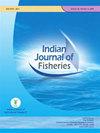添加糖蜜对南美白对虾(Penaeus vannamei Boone,1931)室内饲养期间生长性能、水质和微生物动态的影响
IF 0.3
4区 农林科学
Q4 FISHERIES
引用次数: 0
摘要
对太平洋白腿虾(Penaeus vannamei Boone,1931)幼虾进行了一项研究,以确定补充霉菌对生长性能、培养环境和饲养水微生物动力学的影响。添加糖蜜组在55天实验结束时的体重增加显著降低(p0.05),存活率较高。糖蜜的补充也改善了饲养水质。糖蜜补充罐后水中的总氨氮(TAN)水平(2.213±0.165ppm)显著低于对照组(2.915±0.191ppm)(p<0.05)。两组水体的总异养细菌(THB)和总弧菌(TV)负荷无显著差异。然而,与对照组相比,添加糖蜜组的TV与THB的比例显著降低。本研究表明,添加糖蜜可以显著提高凡纳滨对虾的生长性能,提高饲料利用率,还可以通过降低水中有毒气体(即氨)的水平来改善水质。关键词:氨,碳氮比,糖蜜,弧菌本文章由计算机程序翻译,如有差异,请以英文原文为准。
Effect of molasses supplementation on growth performance, water quality and microbial dynamics during indoor rearing of pacific white shrimp Penaeus vannamei Boone, 1931
A study was conducted with Pacific white-leg shrimp (Penaeus vannamei Boone, 1931) juveniles to ascertain the effect ofmolasses supplementation on the growth performance, culture environment and microbial dynamics of rearing water. Theweight gain at the end of the experiment of 55 days duration were significantly (p<0.05) higher in molasses supplementedgroup (12.08±0.45 g) as compared to control (10.44±0.34 g). Apparent feed conversion ratio (AFCR) was found significantly(p>0.05) lower in case of molasses supplemented group with higher survival percentage. Supplementation of molasses alsoimproved the rearing water quality. The total ammonia nitrogen (TAN) level was significantly (p<0.05) lower in the rearingwater of molasses supplemented tank (2.213±0.165 ppm) compared to control (2.915±0.191 ppm). There was no significantdifference in total heterotrophic bacteria (THB) and total Vibrio (TV) load between the water of the two groups. However,the proportion of TV to THB was significantly lower in case of molasses supplemented group as compared to control. Thisstudy indicated that supplementation of molasses can significantly improve the growth performance of P. vannamei withbetter feed utilisation and also improves the water quality by reducing the level of toxic gas i.e. ammonia in water.
Keywords: Ammonia, C:N ratio, Molasses, Vibrio
求助全文
通过发布文献求助,成功后即可免费获取论文全文。
去求助
来源期刊

Indian Journal of Fisheries
FISHERIES-
CiteScore
0.90
自引率
20.00%
发文量
0
审稿时长
6-12 weeks
期刊介绍:
Indian Journal of Fisheries is published quarterly by the Indian Council of Agricultural Research (ICAR), New Delhi. Original contributions in the field of Fish and fisheries science are considered for publication in the Journal. The material submitted must be unpublished and not under consideration for publication elsewhere.
Papers based on research which kills or damages any species, regarded as thratened/ endangered by IUCN crieteria or is as such listed in the Red Data Book appropriate to the geographic area concerned, will not be accepted by the Journal, unless the work has clear conservation objectives.
 求助内容:
求助内容: 应助结果提醒方式:
应助结果提醒方式:


